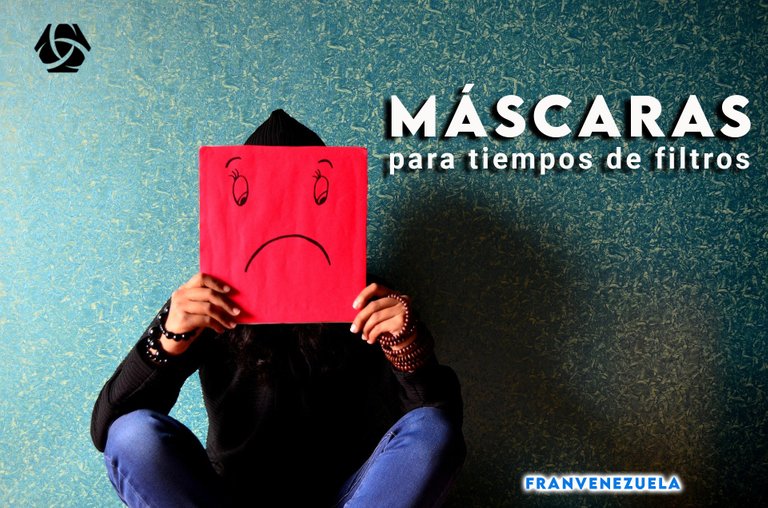Hablar de máscaras en tiempos de pandemia puede llevarnos a pensar que el artículo es sobre el barbijo o tapabocas, pero amigos de #hive este post no va por allí.
Quiero que hablemos de las mascaras de nuestro actuar, partiendo del hecho que somos personas que utilizamos máscaras, es decir somos actores de nuestro vivir, eligiendo desempeñar papeles protagónicos o secundarios.
Esta afirmación, obedece a lo dicho por investigadores que indican que la etimología del termino persona se refiere al uso de máscaras, por cuanto lo vinculan con el término prosopon, que en el teatro griego era la acción de los actores para mostrar al público su carácter y estado emocional.
Ahora bien, estamos en un momento vertiginoso donde las redes sociales nos bombardean con imágenes donde la felicidad, el éxito y la riqueza es lo ordinario, siendo extraordinario que no vivamos ese supuesto estado de plenitud, afectando ello nuestra salud emocional, llevándonos a esconder nuestras máscaras: realidad afectiva y emocional, recurriendo a filtros para presentarnos ante el mundo.
Nos presiona la cultura de los filtros, porque nos hace perseguir una belleza digital, una falsa prosperidad económica, reconocimiento social basado en like , en otros casos la construcción de amistades que no existen, causando lo que teóricos definen como dismorfia de redes sociales.
Esto ha ocasionado que nos mostremos plenos y felices, olvidándonos serlo, como bien lo afirmó François de la Rochefoucauld: “ponemos más interés en hacer creer a los demás que somos felices que en tratar de serlo”.
Lo antes referido, lo refleja un estudio de la Royal Society of Public Health y la Universidad de Cambridge en el que se indica que "los jóvenes que pasan más de dos horas al día en redes sociales como Facebook, Twitter o Instagram son más propensos a sufrir problemas de salud mental, sobre todo angustia y síntomas de ansiedad y depresión".
Es por ello, que la utilización de filtros está haciendo daños en nuestra salud mental, por un lado nos promueven una cultura donde la vanidad debe alimentarse de forma constante, así mismo el engaño y la mentira se vuelven dominantes, porque nos mostramos como queremos ser y no como realmente somos, aunado a ello tenemos la cultura de la envidia y el odio, al ver a otros exitosos y nosotros no serlo.
Significa entonces, que la educación, el apoyo familiar y la interacción social positiva deben ser los antidotos que debemos poner a disposición de todos, para evitar un mayor daño del que ya muchos estamos padeciendo.
Sé que estas líneas tienen un inclinación negativa sobre le mundo virtual que las redes sociales promueven, pero al ver casos como el de Essena O’Neil y su denuncia sobre la perfección artificial hecha para llamar la atención" que estaba convirtiendo su vida en "miserable", me llevan a promover una cultura a favor de la educación, la transparencia, la autovaloración positiva, el uso y aprendizaje de nuestras emociones.
Es el momento de usar las máscaras de forma correcta, para no dar espacios a filtros esclavizantes, porque en la medida que sabemos expresar nuestros enfados, tristezas, angustias o alegrías podremos interactuar de manera efectiva con nuestro mundo exterior.
Nos preocupan los seguidores y los me gusta, pero debemos valorar nuestros amigos y familiares, aprovechando que las distancias se acortan gracias a la tecnología.
En definitiva, nuestra felicidad no está en lo que decimos ser, sino en lo que somos, siendo necesario valorarnos y aceptarnos para movernos sanamente en la sociedad, siendo los actores principales de nuestra magna obra, esa que llamamos vivir.

Masks for filter times
Talking about masks in times of pandemic may lead us to think that the article is about the chinstrap or mask, but friends of #hive this post is not there.
I want us to talk about the masks of our acting, starting from the fact that we are people who use masks, that is, we are actors of our lives, choosing to play leading or supporting roles.
This statement is due to what has been said by researchers who indicate that the etymology of the term person refers to the use of masks, since they link it with the term prosopon, which in Greek theater was the action of the actors to show the public their character and emotional state.
Now, we are in a dizzying moment where social networks bombard us with images where happiness, success and wealth are the ordinary, being extraordinary that we do not live that supposed state of fullness, affecting our emotional health, leading us to hide our masks: affective and emotional reality, resorting to filters to present ourselves to the world.
The culture of filters pressures us, because it makes us pursue a digital beauty, a false economic prosperity, social recognition based on like, in other cases the construction of friendships that do not exist, causing what theorists define as dysmorphia of social networks.
This has caused us to show ourselves full and happy, forgetting to be so, as François de la Rochefoucauld said: "we are more interested in making others believe that we are happy than in trying to be so".
The aforementioned is reflected in a study by the Royal Society of Public Health and the University of Cambridge which indicates that "young people who spend more than two hours a day on social networks such as Facebook, Twitter or Instagram are more likely to suffer mental health problems, especially anxiety and symptoms of anxiety and depression".
That is why the use of filters is damaging our mental health, on the one hand they promote a culture where vanity must be constantly fed, likewise deception and lies become dominant, because we show ourselves how we want to be and not how we really are, coupled with this we have a culture of envy and hatred, seeing others successful and we are not.
It means, then, that education, family support and positive social interaction should be the antidotes that we must make available to all, to avoid greater damage than many of us are already suffering.
I know that these lines have a negative inclination on the virtual world that social networks promote, but when seeing cases like that of Essena O'Neil and his complaint about the artificial perfection made to attract attention "that was turning his life into" miserable, lead me to promote a culture in favor of education, transparency, positive self-assessment, the use and learning of our emotions.
It is time to use the masks correctly, so as not to give spaces to enslaving filters, because to the extent that we know how to express our anger, sadness, anguish or happiness, we will be able to interact effectively with our outside world.
We care about followers and I like them, but we must value our friends and family, taking advantage of the fact that distances are shortened thanks to technology.
In short, our happiness is not in what we say we are, but in what we are, being necessary to value and accept ourselves to move healthily in society, being the main actors of our great work, that which we call living.
Foto tomada de Pixabay y editas en psd
La traducción es hecha en Google

Congratulations @franvenezuela! You have completed the following achievement on the Hive blockchain and have been rewarded with new badge(s) :
You can view your badges on your board and compare yourself to others in the Ranking
If you no longer want to receive notifications, reply to this comment with the word
STOPTo support your work, I also upvoted your post!
Gracias.
The rewards earned on this comment will go directly to the person sharing the post on Twitter as long as they are registered with @poshtoken. Sign up at https://hiveposh.com.